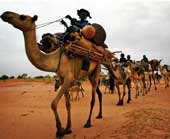|
|
| Creatures of wonder |
“Crime unpunished breeds criminals.” I’ve said this before; I said it again when Sanjay Dutt and others convicted for the Bombay blasts and the assassins of the former Punjab chief minister, Beant Singh, were sentenced for crimes they had committed. When we are moved to tears seeing pictures of grieving relatives of the convicts, we should also remember the mothers and sisters of those they murdered in cold blood. I only wish that the penalties awarded to them were different from hanging or imprisonment. In the case of Sanjay Dutt, if the judge had granted him parole during daytime to continue working in films on the condition that whatever he earned was given to the relations of the blast victims, I am sure both parties would have been happier.
My second observation is: “When punishment for crimes is unduly delayed, it creates the impression that the criminal has got away with it.” Both the crimes I have referred to took place more than 12 years ago. Most people had forgotten they had taken place. This is not good enough. In the West, criminals are brought to justice within a year or two. Even in our country, criminal justice was speedier during the British Raj than in independent India. The police and the judiciary must aim to finish a criminal trial at the most by two years.
And finally, my third observation: “Justice must be even-handed; otherwise it gets tainted as discriminatory.” We have allowed it to become tainted. Criminals responsible for the destruction of the Babri Masjid remain unpunished. One became our deputy prime minister, another a cabinet minister, two chief ministers of states. All of them are Hindus. I am pretty certain that if the old mosque had not been destroyed or the vandals who had destroyed it were promptly arrested and tried, there would have been no bomb blasts in Bombay. To this day, perpetrators of this crime roam freely preaching sermons about peace and harmony. We also have the Sri Krishna Commission Report identifying members of the Shiv Sena responsible for crimes in Maharashtra. No action has been taken because the men accused are Hindus. This has created the impression that in secular India there is one law for the Hindus, another for the Muslims. Is this fair?
Camels in the Quran
One day I came across an article in an American journal which, among other things, said that there was no mention of a camel in the Quran. I thought it was very odd as Allah had revealed the Quran in Arabic to an Arab prophet of a country in which the most visible animal was the camel. Moreover, the prophet himself was employed by a lady he later married, who was engaged in trading caravans of camels. I consulted my Muslim friends. They expressed surprise but could not enlighten me on the subject. I put it to Syeda Hameed of the Planning Commission, who is more into Islam than my other friends. First, she said, “What about the camel going through the eye of needle?” I shot back: “That is in the Bible not the Quran.” Thereafter, as is my habit, I began to pester her with the same question: “Have you found a camel in the Quran?” One afternoon she rang me up from her office and quoted the chapter and verse, “See Sura 88 .”
It read:
Are you aware of the overwhelming?
Faces on that day will be shamed.
Labouring & exhausted, suffering in
a hellfire;
Winking from a flaming spring; they
will have no food except the useless
variety;
It never nourishes, nor satisfies
hunger,
Other faces on that day will be full of
joy;
Satisfied with their work;
In an exalted paradise;
In it no nonsense is heard;
In it a spring flows.
In it are luxurious furnishing,
And drinks made available
And pitchers in rows.
And carpets throughout
Why do they not reflect in the camels
and how they are created?”
And so on. My quest was at an end.
Treasuring a thought
General Musharraf says, “The
Army men
Who died in ‘Silence Operation’
Were martyrs, for they laid down
their lives
For the sake of the Pakistani
Nation.”
Radicals say, “Jihadis of Lal Masjid
Were pitted against an alien demon
Since they were martyred in a Holy
War
They will straight-away go to
heaven.”
I wondered whom will God send to
heaven
And whom will he hold behind.
While my mind was seized of this
doubt
A Ghalib’s verse came to my mind:
“Ham ko maloom hai jannat ki
haqiqat lekin
Dil ko khush rakhne ko Ghalib
Yeh khayal achcha hai.”
(We know the reality of paradise
But we treasure its thought Ghalib, For it keeps on beguiling us.)
(Contributed by G.C. Bhandari, Meerut)











